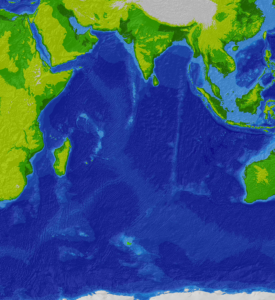
France and India have agreed to cooperate on space-based maritime domain awareness in the Indian Ocean.
This decision to increase cooperation is seen as a geopolitical countermove to what many Indian analysts believe are increasing attempts by China to gain superiority in the Indian Ocean. France and India will now explore ways to use satellites for maritime surveillance and collaborate on plans for inter-planetary missions.
Proceeding from talks between Indian Prime Minister Modi and French President Macron, India’s Space Research Organisation (ISRO) and the French National Space Agency (CNES) will work together on the design and development of joint products and techniques to monitor and protect their assets on land and at sea, said the Joint Vision for Space Cooperation issued after the meetings.
ISRO and CNES also signed an agreement for end-to-end solutions for detection, identification, and monitoring of vessels in regions of interest. They will cooperate to protect their respective space-based assets, including infrastructure and information-sharing on space events, and develop a wider dialogue on space situational awareness (SSA).
“ISRO and CNES would work together for the design and development of joint products and techniques, including those involving Automatic Identification System (AIS), to monitor and protect the assets in land and sea,” the joint statement said. “In particular, both sides will pursue the study of a constellation of satellites for maritime surveillance.”
Space cooperation between India and France spans more than 50 years, and India has used the French launch facility at Kourou in French Guiana to send its heavy satellites into space.
Additionally, the two countries agreed to work together on inter-planetary missions.
“ISRO and CNES would work together on autonomous navigation of rovers in Moon, Mars and other planets, aero braking technologies for planetary exploration, modelling of Mars and Venus atmosphere and inflatable systems for Venus exploration. Both sides can embark on complex high technology space science and planetary exploration missions in future,” the statement explained.
To date, India has had two successful inter-planetary missions to the Moon and Mars. It is working to launch Chandrayaan 2 this year and a study is underway to plan a mission to Venus.
The two countries also agreed to strengthen collaboration in the areas of space transportation systems and the development of technologies for human exploration of the universe.


